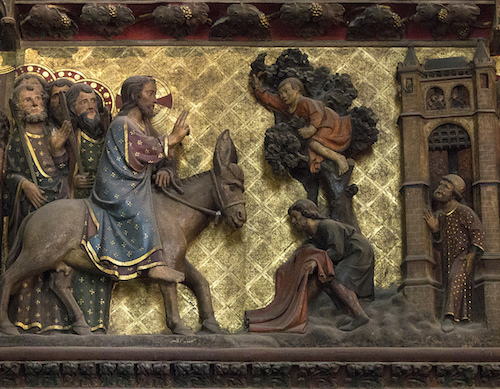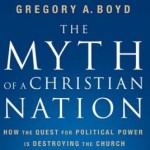We run our website the way we wished the whole internet worked: we provide high quality original content with no ads. We are funded solely by your direct support. Please consider supporting this project.

Palm Sunday, Partisan Politics & the Power of the Cross
Today we’re sharing something from David D. Flowers that we found especially insightful as we approach holy week. We hope it blesses you and moves you to more fully manifest the kingdom that is not of this world.
~~~
We remember it in the church as Palm Sunday. This is the triumphal entry of Jesus into Jerusalem. It’s the day when Jesus of Nazareth pre-planned a comical, yet prophetic event, in order to fulfill Zechariah’s prophecy of the coming Messiah (Zech 9:9).
Jesus literally acts it out.
It’s no coincidence. At the same time Pilate is parading in on the west side of the Temple to oversee Passover, ready to put a stop to any chaos that might ensue, Jesus decides to ride into Jerusalem on a donkey. He’s not on a war horse wielding a sword, he’s on a donkey. And he’s not packing.
Think about that.
Not quite the entrance folks were expecting from their Messiah.
Nevertheless, the crowds give him a royal welcome. They shouted, “Hosanna to the Son of David! Blessed is he who comes in the name of the Lord!”
And all of this to the waving of palm branches, symbolic of Messianic deliverance to the Jews, clearly harkening back to the time the Maccabees threw off Greek rule in Judea. Everyone understands this scene.
This is it. It’s Jesus’ time to prove himself as the long-awaited Messiah, the son of God. Will he go to the Antonio Fortress, where the largest garrison of soldiers are housed in Jerusalem, where Rome kept an eye on things? No doubt, the crowd could quickly turn into a mob and rush the place.
But he doesn’t take a right for the fortress, instead he goes left through the eastern gate, and into the Temple. He goes in, looks around, and according to Mark’s gospel, he leaves and returns the next day for some prophetic theater in the spirit of Jeremiah. We all know what happens next.
He wasn’t “cleansing” the Temple. He was shutting it down.
By the end of the week, Jesus had pretty much peeved everyone off. And early Friday morning Jesus is standing before Pilate saying:
“My Kingdom is not an earthly kingdom. If it were, my followers would fight to keep me from being handed over to the Jewish leaders. But my Kingdom is not of this world.” John 18:36 NLT
He said his kingdom is not of this world. Wait… what?
What does Jesus mean that his kingdom is not of this world?
Click here to read the rest of David’s thoughts.
Photo credit: Lawrence OP via Visual Hunt / CC BY-NC-ND
Category: General
Tags: David D. Flowers, Easter, Politics, Upside-Down Kingdom
Related Reading

The Problem with “Church”
Many people think of church as a religious building people attend once a week to sing, hear a sermon, take an offering and perhaps participate in the Lord’s Supper (or “take Communion”). Many refer to the church as “the house of the Lord,” imagining that God is more present in this sacred building and during church…

The Politics of Jesus, Part 2
Even in the midst of politically-troubled times, we are called to preserve the radical uniqueness of the kingdom. This, after all, is what Jesus did as he engaged the first century world with a different kind of politics (see post). To appreciate the importance of preserving this distinction, we need to understand that the Jewish…

The Wrong “Bulls-Eye”: Reflections on the “Christian Left”
As it has since the fourth century, the Church today for the most part operates with a Constantinian (“power-over”) paradigm. Because of this, most socially concerned Christians are inclined to define the Church’s mission as adjudicating between and tweaking political options “in Jesus’ name.” We accept Caesar’s definition of “power” as the ability to get…

What is the Kingdom of God (Part 1)
We all know what the Kingdom of God is, right? But this is precisely the problem. Since we are all to a large extent products of our culture, what seems obviously true and right to us will be at least influenced, if not determined, by what seems obviously true and right to our culture. This,…

Shouldn’t preachers rally Christians to fight political injustice?
Question: My pastor has publicly supported your book The Myth of a Christian Nation. But he’s recently called on the church to take a stand against the injustice of our local government cutting funding for inner city recreational facilities. This seems right to me, since we’re suppose to defend the cause of the poor and…

“The kingdom of God…advances only by exercising power under others. It expands by manifesting the power of self-sacrificial, Calvary-like love.” [Quotes]
“While all the versions of the kingdom of the world acquire and exercise power over others, the kingdom of God, incarnated and modeled in the person of Jesus Christ, advances only by exercising power under others. It expands by manifesting the power of self-sacrificial, Calvary-like love.”
